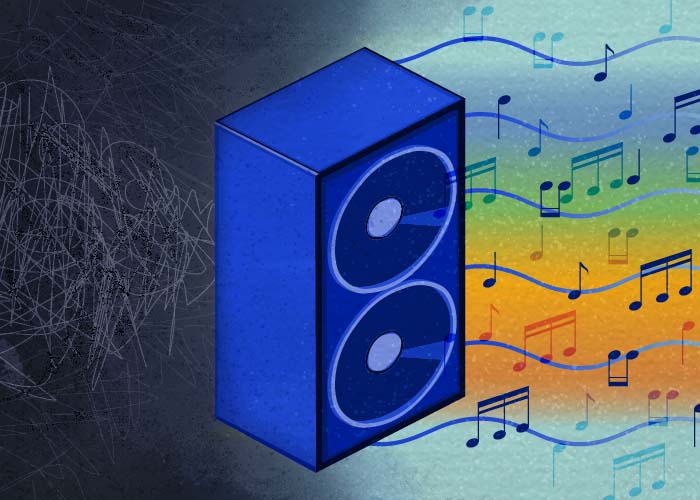
illustration by Shannon Alexander
6 tips to tap into the stress-busting power of music
Before she studied the plentiful evidence that music can alleviate stress, Ferol Carytsas was a kid who discovered that playing piano made her feel better. Today, she’s a professor with the University of Florida’s Center for Arts in Medicine, where she shares how music can reduce pain, boost mood, build healthy habits and improve lives for people with conditions from PTSD to dementia.
We asked her advice for harnessing the power of music to cope with stress.
1) Know your patterns. Part of using music effectively is understanding when it can help, Carytsas said. Find those windows by learning to identify when your stress is starting to spike. “When I'm getting stressed out, I can feel my muscles tense, I feel my heart start to beat a little bit faster,” she said. Try to catch your own pattern early and redirect it by listening to or even making music. “It doesn’t have to be complicated. You could just drum on the table with your fingers."
2) Cue yourself. When tuning into news or scrolling through potentially aggravating social media, consider setting a timer to limit your intake, then make time afterward to decompress with music. “At the end of that session, what would happen if you played some music or even danced around your house? Just approach it with openness — ‘I'm going to try this to see if it helps.’”
3) Experiment with what works for you. Your favorite songs might not be what you need when you’re feeling frazzled. For Carytsas, pop music doesn’t soothe. She prefers instrumentals — “nothing too distracting, but nothing too predictable, either.” Your mileage may vary. She suggests curating a playlist and tinkering with it until you figure out what relaxes you best.
4) Pick up an instrument. “The No. 1 thing I hear from adults when I say I’m a musician is, ‘I used to play and I'm really sad I gave it up, ’” Carytsas said. If that’s you, pick it back up! If your former instrument isn’t practical (tuba solo, anyone?), jump into a new one. The same is true if you still play: Trying a different instrument can put you in a fresh headspace. If you’ve never played, you could try something with a low barrier to entry like ukulele. But instead of focusing solely on what’s quick to learn, think about the experience you crave, she advised. What will feel most comforting? Strumming a guitar? Banging a drum? The resonance of strings? “It’s not just about ease, but also the sensation of the instrument and what it feels like to you.”
5) Does all that sound too complicated? Sing! “Singing is a really, really great stress reducer. If you’re concerned about how you sound, sing in the car when nobody can hear you.” You could even try songwriting, Carytsas said. “It’s not always about the product, it’s about the process. Focus on whether it brings joy.”
6) Experiment with other art forms. “You have to be open to the idea of music. If you don't want music in that moment, it's probably not going to achieve the effect you are seeking.” The good news is that plenty of art forms can improve wellbeing, from painting to theater, Carytsas said. “You just need to have that initial openness to the arts and find what works for you.”
For more on how the arts can foster health and wellness, visit the UF College of the Arts’ Center for Arts in Medicine.
